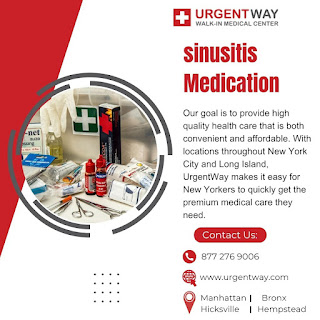Which Sinusitis Medication Works Best for Long-Term Relief?
Which Sinusitis Medication Works Best for Long-Term Relief?
Sinusitis is one of the most common
reasons people visit their doctor, especially when nasal congestion, pressure
around the eyes, and recurring headaches make everyday life difficult. A lot of
patients often ask their ENT specialist or family doctor:
The answer is not the same for
everyone. The right sinusitis medication depends on the cause, the type of
sinusitis (acute or chronic), and whether the condition is triggered by
allergies, infection, or structural problems in the nose. In this article, we
will break down the different types of sinusitis medication, how they work, and
what patients should know before starting treatment.
Understanding
Sinusitis
Before diving into sinusitis
medication, it’s important to understand what sinusitis actually is. Sinusitis
occurs when the tissue lining the sinuses becomes inflamed or swollen.
Normally, sinuses are filled with air, but when they are blocked with mucus or
infected by bacteria, viruses, or fungi, they can cause:
- Nasal congestion
- Facial pressure or pain
- Postnasal drip
- Headaches
- Loss of smell
- Cough, especially at night
There are two main types of
sinusitis:
- Acute sinusitis:
Lasts less than 4 weeks, often caused by colds or infections.
- Chronic sinusitis:
Lasts 12 weeks or longer and may need more advanced sinusitis medication
or even surgery.
Types
of Sinusitis Medication
Doctors usually recommend a step-by-step
approach to sinusitis treatment, starting with the least invasive option. Here
are the main categories of sinusitis medication:
1.
Over-the-Counter (OTC) Sinusitis Medication
For mild or early sinusitis, OTC
medications can be very effective. Common options include:
- Pain relievers:
Acetaminophen (Tylenol) or ibuprofen (Advil, Motrin) to reduce pain and
inflammation.
- Decongestants:
Pseudoephedrine (Sudafed) or phenylephrine to reduce nasal swelling.
- Nasal sprays:
Oxymetazoline (Afrin) can provide quick relief but should not be used for
more than 3 days due to the risk of rebound congestion.
2.
Prescription Sinusitis Medication
When symptoms don’t improve with OTC
options, doctors may prescribe stronger sinusitis medication.
- Antibiotics:
Prescribed only if bacterial sinusitis is suspected. Common choices
include amoxicillin-clavulanate, doxycycline, or levofloxacin.
- Steroid nasal sprays:
Such as fluticasone (Flonase), mometasone (Nasonex), or budesonide
(Rhinocort) to reduce inflammation.
- Oral corticosteroids:
Short courses of prednisone may be given for severe inflammation.
3.
Allergy-Related Sinusitis Medication
Many chronic sinus infections are
linked to untreated allergies. Allergy-related medications may include:
- Antihistamines:
Loratadine (Claritin), cetirizine (Zyrtec), or fexofenadine (Allegra).
- Leukotriene modifiers:
Montelukast (Singulair), useful for patients with both sinusitis and
asthma.
- Allergy shots (immunotherapy): Long-term solution for allergy-triggered sinusitis.
4.
Saline Irrigation and Home Remedies
Although not “medications” in the
strict sense, saline irrigation is often recommended alongside sinusitis
medication. Using a neti pot or saline spray helps flush out mucus, allergens,
and bacteria. This simple step can improve the effectiveness of prescribed
sinusitis medication.
Other supportive measures include:
- Drinking plenty of fluids
- Using a humidifier
- Warm compresses over the face
Choosing
the Right Sinusitis Medication: What Doctors Consider
When patients ask “Which
sinusitis medication works best?” doctors typically consider:
- Cause of sinusitis:
Viral sinusitis does not need antibiotics, while bacterial sinusitis may
require them.
- Duration of symptoms:
Acute vs. chronic sinusitis influences medication choice.
- Patient history:
Allergies, asthma, and previous response to treatment matter.
- Severity:
Mild cases may need OTC medication, while severe swelling may require
steroids.
Risks
and Side Effects of Sinusitis Medication
Every sinusitis medication has
possible side effects.
- Decongestants:
Can raise blood pressure, cause insomnia, or lead to dependency if nasal
sprays are overused.
- Antibiotics:
May cause stomach upset, diarrhea, or antibiotic resistance if misused.
- Steroids:
Long-term use can weaken immunity and cause weight gain or mood changes.
- Antihistamines:
Can make some people drowsy.
When
Sinusitis Medication Alone Isn’t Enough
Sometimes, medication is not enough
to treat chronic or severe sinusitis. Doctors may suggest:
- Endoscopic sinus surgery: To remove blockages and improve airflow.
- Balloon sinuplasty:
A minimally invasive option where a small balloon opens blocked sinus
passages.
- Polyp removal:
If nasal polyps are contributing to chronic infections
Lifestyle and Prevention Alongside Sinusitis Medication
In addition to taking sinusitis medication,
lifestyle changes can reduce flare-ups:
·
Manage seasonal allergies
with preventive medication.
·
Avoid cigarette smoke and
environmental irritants.
·
Wash hands frequently to
prevent viral infections.
·
Stay hydrated to thin
mucus.
Conclusion:
Choosing the right sinusitis medication is not
a one-size-fit
s-all decision. For some, OTC remedies may be enough. For others,
especially those with chronic sinusitis, prescription medication or even
surgical options may be required.
UrgentWay Walk-In Medical Center, we provide fast, affordable, and compassionate care for
your whole family. Whether you need treatment for sinus infections treatment for, flu,
allergies, or routine checkups, our experienced doctors are here to help no
appointment needed. With convenient locations and extended hours, you can walk
in anytime and get the care you deserve.
.png)



Comments
Post a Comment